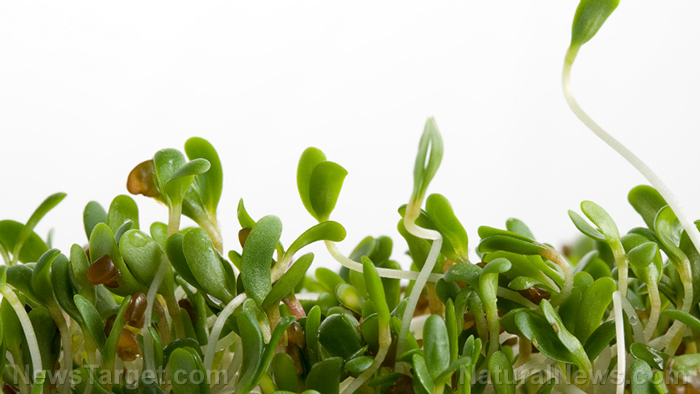Mexican marigold essential oil holds potential as powerful natural herbicide
02/01/2019 / By Edsel Cook

The Mexican marigold (Tagetes erecta) is a beautiful flowering plant from Central America. It has been used as an ornament, edible food, a source of dye, and herbal medicine for many centuries. Thai researchers reported that its essential oils are a natural herbicide for some of the most common weeds that plague farms.
Cockspur grass (Echinochloa crus-galli) is one of the more common weeds that came from Asia. It likes to grow in swamps and other water-logged places. It is considered a pest in rice fields and similar crops that require a lot of water.
Normally, farmers use synthetic herbicides to kill cockspur grass and other weeds. However, these artificial chemicals have dangerous side effects on humans, animals, and the environment. Furthermore, excessive use of herbicides has caused many weeds to develop resistance.
Researchers have been looking for organic alternatives to control weeds and protect important agricultural crops, without harming living things or the environment. They are very interested in essential oils, which contain many natural chemicals that can kill microorganisms and weeds. (Related: Study shows Mexican marigold can be used as a natural herbicide.)
The weed-killing potential of the Mexican marigold
The King Mongkut’s Institute of Technology Ladkrabang (KMITL) study had two objectives. First, it would determine the chemical composition of the essential oil of Mexican marigold. Second, it would test the oil for its ability to control the growth of cockspur grass before and after the weed emerged from the ground.
100% organic essential oil sets now available for your home and personal care, including Rosemary, Oregano, Eucalyptus, Tea Tree, Clary Sage and more, all 100% organic and laboratory tested for safety. A multitude of uses, from stress reduction to topical first aid. See the complete listing here, and help support this news site.
The researchers collected fresh samples of Mexican marigold. They extracted the essential oil and ran it through a test to determine the types and amount of chemicals present.
The essential oil served as the basis for the formula of an emulsifiable concentrate. The concentrate would be dissolved in water and applied as a herbicide.
For the pre-emergence test, different doses of the concentrate were sprayed onto soil that contained the seeds of cockspur grass. The researchers measured the number of seeds that successfully germinated and grew after being treated with the Mexican marigold formula.
In the post-emergence test, the cockspur grass was allowed to grow unhindered for 21 days after the seedlings first emerged from the ground. The weeds were then treated with doses of 10 to 80 milliliters of emulsifiable concentrate.
Essential oil naturally kills weeds by disrupting their photosynthetic ability
The extraction process produced 0.72 milligrams of essential oil from every 100 grams of Mexican marigold. The oil contained large amounts of monoterpenes and sesquiterpenoids.
The most common monoterpene was piperitone, which made up 17.12 percent of the essential oil. Among the sesquiterpenoids, neophytadiene was the most plentiful representative at 16.8 percent.
The emulsified concentrate demonstrated significant herbicidal effects during both the pre-emergence and post-emergence phases. In the pre-emergence phase, the minimum effective concentration required to stop cockspur grass seeds from germinating and growing was two milliliters per 100 milliliters of water.
Researchers found that the concentrate disrupted the activity of alpha-amylase. This is an enzyme that plays a big role in the germination and growth of seeds.
In the post-emergence phase, the emulsified concentrate caused the cockspur grass seedlings to wither and become desiccated. Analysis of the affected weeds showed low levels of chlorophyll a, chlorophyll b, and carotenoids.
The essential oil appeared to hamper the photosynthetic metabolism that provided food for the plant. It also weakened the cell membrane of the weed. Finally, it caused a rise in thiobarbituric acid reactive substances, which are produced when lipids are broken down through oxidative reaction.
The KMITL researchers reached the conclusion that the essential oil of the Mexican marigold possessed sufficient phytotoxic effects to serve as a natural herbicide.
Visit Monsanto.news to find out the dangers of using synthetic herbicides and pesticides.
Sources include:
Tagged Under: agriculture, cockspur grass, essential oil, Mexican marigold, natural herbicides, natural weed control, organic farming methods, Plants



















